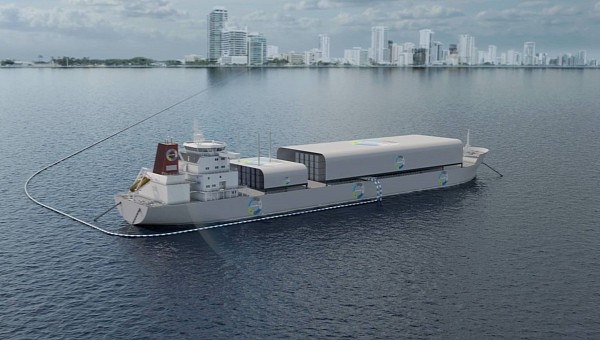Clean energy, sustainability, and a solution for bringing fresh water to areas where this resource is scarce - all of these goals will be wrapped into a unique concept called a “floating desalination vessel (FDV).”
One of the numerous environmental concerns affecting humanity is the scarcity of fresh water. It’s an old problem that needs new solutions. One of them comes from a Norwegian company that was founded a decade ago. EnviroNor’s founder and chief executive, Sigmund Larsen, came up with four innovative concepts based on an apparently-simple idea – turning old tankers from the oil industry into floating platforms that can produce and deliver clean, drinkable water.
The concept of integrating desalination and wastewater treatment units into a tanker was nominated for the Tanker Environment Award in 2019 and has now reached another milestone. It looks like the reputable Japanese shipyard Mitsui O.S.K. Lines (MOL) will turn this Norwegian idea into reality.
The two companies have recently signed an MoU (Memorandum of Understanding) agreeing to bring to life this type of FDV for commercialization. Tankers of various sizes will be converted into floating desalination plants using adequate equipment and clean sources of energy. Through reverse osmosis (RO) membranes, the FDV will eliminate salt and all impurities, producing drinking water and then supplying it to shore.
In addition to addressing the huge issue of freshwater scarcity in certain areas, this project is also sustainable. On one hand, it helps make the tanker market greener because it provides an eco-friendly solution for removing former oil tankers from service, a solution that’s easier compared to the standard scrapping policy required by the EU.
On the other hand, it’s a sustainable process for desalination. Compared to the land-based desalination plants, this project uses fewer resources (it doesn’t need the acquisition of land), and it’s much more flexible. Also, by converting oil tankers instead of building new vessels from scratch, the process can be completed much faster and more effectively.
The concept of integrating desalination and wastewater treatment units into a tanker was nominated for the Tanker Environment Award in 2019 and has now reached another milestone. It looks like the reputable Japanese shipyard Mitsui O.S.K. Lines (MOL) will turn this Norwegian idea into reality.
The two companies have recently signed an MoU (Memorandum of Understanding) agreeing to bring to life this type of FDV for commercialization. Tankers of various sizes will be converted into floating desalination plants using adequate equipment and clean sources of energy. Through reverse osmosis (RO) membranes, the FDV will eliminate salt and all impurities, producing drinking water and then supplying it to shore.
In addition to addressing the huge issue of freshwater scarcity in certain areas, this project is also sustainable. On one hand, it helps make the tanker market greener because it provides an eco-friendly solution for removing former oil tankers from service, a solution that’s easier compared to the standard scrapping policy required by the EU.
On the other hand, it’s a sustainable process for desalination. Compared to the land-based desalination plants, this project uses fewer resources (it doesn’t need the acquisition of land), and it’s much more flexible. Also, by converting oil tankers instead of building new vessels from scratch, the process can be completed much faster and more effectively.





